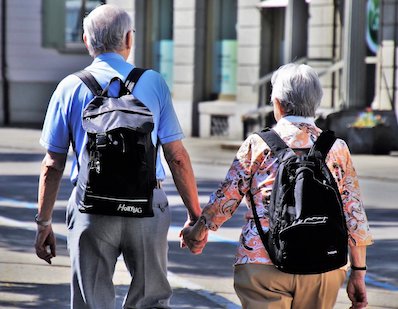Each year, millions of seniors travel on our roads and airways. While many people find traveling somewhat inconvenient, for seniors with health problems – it can be quite a challenge.
Traveling long distances may often involve changes in a person’s normal sleep pattern, urinary pattern and diet. The person may also be traveling to a part of the world where the weather, pollution, or altitude could vary significantly from what they are used to.
While some situations may arise unexpectedly, seniors can take the following steps when they are planning a trip:
* Don’t forget to bring all your medications. Always bring an extra couple of days’ worth in case your trip runs longer than you expected.
* Keep your medications with you in your carry-on luggage. Don’t put them with your check-in luggage. If you use syringes for insulin or narcotic medications for pain, bring documentation from your doctor or pharmacist, to avoid problems with security personnel at the airport. Many countries may not have the medical facilities you have grown accustomed to. If you get injured abroad, you may be in big trouble. So don’t take try to avoid risky activities, such as climbing ladders, swimming after drinking alcohol, and so on.
* Get travel insurance if you are traveling to a foreign country, where you are not covered by insurance. In some countries the health care facilities are so poor that you will need to fly out as soon as possible, in case of a medical emergency. If you need to be airlifted, it can cost anywhere between thirty thousand to a hundred thousand dollars, depending on where you are. Make sure you know the restrictions and clauses that address preexisting conditions.
* Since heart attacks can happen overseas, it’s a good idea to bring a copy of your recent ECG. In many cases one of the fastest ways to tell if there is a problem with your heart is to check an ECG and compare it with an old one.
* Consider how you will be travelling. You may want to hire a car or a taxi, rather than use congested public transport or drive on unfamiliar roads.
* Check to make sure that you don’t need any additional immunisations when traveling abroad. You can find out these things online.
* Additional vaccines may include one or more of the following: Hepatitis A and B, a Tetanus booster (every ten years) for Typhoid Fever, for Yellow Fever. Don’t wait until the day or the week before your departure, to get your vaccinations. Some vaccines may take weeks before they start to protect you from an infection. Most likely, your GP may not have these immunisations available. You may need to go to a travel medicine clinic or your local health department. Be careful to follow all the recommendations regarding local food and water in the country you plan to visit.
*Older adults are more vulnerable to becoming dehydrated from traveler’s diarrhoea. It is recommended to take a five day course of an antibiotic, such as Ciprofloxacin (Cipro), with you and probably some Immodium for diarrhoea. Be sure to check with your local GP before making medication changes. Make sure you leave a copy of your itinerary with your family or friends. In case of an emergency, you want to make sure that someone can contact you.
*Because of the disruption that occurs with traveling (change in sleep schedule, diet, etc.) diabetics need to be more careful about checking their blood sugar levels.
*Carry an extra set of eye classes. Carry comfortable foot wear. Carry an alcohol-based hand wash. At high altitudes the air contains less oxygen.
*If you have congestive heart failure, heart disease, anaemia, or COPD/emphysema, check with your doctor before travelling to a place that is at high altitude. This decrease in oxygen can even be a problem during the airplane trip itself. Ask your doctor about whether supplemental oxygen will be of any benefit to you.
*If you are going to a poor country, avoid wearing perfume, as this can attract flying insects that carry diseases. You may want to consider using an insect repellant as well.
Is it safe for senior citizens to travel alone on an airplane?
Airlines are not required to transfer passengers from wheelchair to wheelchair, wheelchair to aircraft seat, or wheelchair to lavatory seat. Furthermore, airline personnel are not obliged to assist with feeding, bodily functions, or providing medication to passengers. Disabled passengers who can’t transfer themselves or care for themselves should travel with a companion or an attendant.
Some extra tips for traveling with a frail senior
Carry an extra set of underwear and pants for your loved one. You never know if and when an accident may occur. You can bring cards to hand to staff and other passengers to tell people that your loved one has dementia. If you are traveling with someone with dementia, remember that the greater the disruption to their normal schedule for sleeping, eating, and activities, the higher the risk that the person will become delirious.
Prevent blood clots in your legs when traveling. Doctors have known for many years that seniors are at particular risk for developing blood clots in their legs after traveling long distances by plane, car, train or bus.
When traveling by car, stop every hour or two to stretch and walk around. Failure to do so may result in increasing the risk of lower back pain, but more importantly, of developing a blood clot in the leg known as “deep vein thrombosis” (DVT). The risk of dangerous blood clots increases importantly with sitting for more than five hours. When traveling by plane, train or bus, get up and walk around every hour or two. Take a low-dose (81 mg) Aspirin daily. Wear compression hose. Use foot stretches to flex the calf muscles and leg stretches to flex the thigh muscles. Stay well hydrated while traveling. Avoid drinks with caffeine or alcohol.
Fight jet lag. People experience jet lag whenever while traveling three or more time zones have to be crossed,. which in general is felt by older people more severely than by younger travellers. Jet lag differs from the travel fatigue that occurs due to difficulty sleeping, changes in diet and other difficulties associated with traveling. While travel fatigue is cured with a good night’s sleep, people suffering from jet lag may need several days to completely adjust to their new environment.
If you are traveling to the east, you will have to adjust your body to wake up one hour later and to go to bed one hour earlier each night for three nights before your trip. When you get in Italy, for example, the clock on the nightstand says 11 PM, but your body still thinks that it is only 3 PM. Some suggestions to prevent eastbound jet lag are: Wake up an hour earlier each day before your trip. Light therapy – turn on bright lights when waking up Melatonin – doses of 0.5 mg have proved to be as effective as doses of 3 mg. However, most studies that analysed whether melatonin was helpful for jet lag involved only younger people. Studies have shown that people who used all three of these methods decreased their jet lag symptoms.
Traveling Westbound – for example, when traveling from New York to Hawaii, your body will think that it is nighttime when in reality it is afternoon. Some things that you should do when traveling Westbound are: when you arrive, try to stay awake while it is daylight and to go to sleep when it gets dark. Avoid caffeine and alcohol. Eat at the times the locals eat, unless the custom is to eat at 1 o’clock in the morning!
If travelling to dangerous places, you should take some basic steps and be aware of your new environment. Stay out of the “bad” part of town. Talk to the staff at the hotel where you stay, to be informed about which neighbourhoods are safe to walk around at night. Don’t wear any jewellery.
Don’t leave your common sense at home. Just because you are on vacation does not mean your brain should go on vacation too. Some things are purely common sense. Wear sun screen when you are outside. Wear seatbelts. Don’t get drunk. Be extra careful when riding a motorbike. Stay out of dangerous neighbourhoods.
In recent years, many seniors have traveled to other countries for the purpose of receiving medical treatment a lot cheaper than in their own country.
When a senior decides to travel or buy a retirement home, there are important issues to consider. Don’t just impulsively act. Think carefully and plan ahead! Travel and vacations are supposed to be fun, planning ahead can keep the experience positive, especially for our loved ones who are older.
By Adrian J.
Christ & Co.













